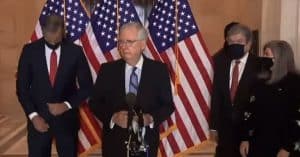Former GOP leader McConnell trips after Senate vote
Mitch McConnell, the former Republican Senate leader, stumbled after exiting the Senate chamber on Wednesday, sparking renewed concerns about his health.
This latest incident comes amidst ongoing discussions about McConnell's decision not to seek re-election as Republican leader due to his previous falls and lingering health issues at the age of 82.
The fall happened right after Mitch McConnell had participated in a vote concerning Scott Turner, the Housing and Urban Development secretary nominee. As McConnell exited the Senate chamber, he lost his balance on a small flight of stairs.
Assistance was quickly at hand, as fellow Senators Steve Daines and Markwayne Mullin helped prevent any serious injury. Witnesses noted that McConnell appeared largely unharmed, according to a report by Fox News.
Health Concerns Due to Past Incidents
This fall adds to a series of similar occasions where McConnell's health has been noted as a concern. As a childhood survivor of polio, McConnell's left leg has continued to feel the complications of the illness over the years.
Despite these challenges, a spokesperson reassured the public, emphasizing that McConnell's work schedule will not be affected. The assurance came with the note that he is employing a wheelchair as a precautionary measure.
These incidents have stirred both public concern and political conversation about McConnell's health. As the former Republican leader, his resilience in the face of physical adversity has been observed since December.
Previous Incidents Raise Questions
In December, McConnell experienced a fall at the Capitol which resulted in minor injuries, including a facial cut and a sprain in his wrist. Following medical clearance, he was able to swiftly return to his Senate duties.
However, a more severe incident occurred in 2023 at a hotel in Washington, D.C. Here, McConnell tripped and sustained a concussion along with fractures to his ribs. He was hospitalized for observation and treatment for several days following the incident, which raised particular concerns.
"I am grateful to the medical professionals for their care and to my colleagues for their warm wishes," McConnell stated after his release from inpatient therapy, accentuating the support and care he received.
McConnell's Long Tenure Ends
In July of the previous year, McConnell froze during a press conference, further fueling speculation about his ability to continue leading. Although promptly aided by colleagues, such as Sen. John Barrasso, doubts continued to linger.
In light of these events, McConnell declared his intent to step down from his long-held leadership role. He expressed his readiness to embrace new chapters in his life, citing wisdom in recognizing when it is time for change.
Despite challenges, McConnell completed his final term as the Republican leader without dereliction of duties. Sen. John Thune succeeded him in November after a confidential ballot, concluding McConnell's remarkable 17-year period as the longest-serving party leader in the Senate.
Continuing Influence and Legacy
McConnell's legacy in the Senate is cast by his contributions spanning many years, even as his health has prompted evaluations of his active role. His decision to step aside came after careful contemplation prompted by these health issues and external expectations.
Well-regarded for his strategic acumen and influence, McConnell has nonetheless faced persistent health trials. His choice reflects a broader narrative of balancing professional responsibilities and personal health.
The latest fall underscored these dual influences in McConnell's life and career, bringing his earlier words on understanding transition into sharper focus.
While health challenges continue to be a backdrop to McConnell's public service, his decisions signal the onset of a period of adjustment and reflection. This adaptation resonates with both supporters and critics alike.
For many, McConnell's recent incidents serve as a testament to his determination to maintain his contributions, despite evident adversities. Yet they also point to broader conversations about leadership succession and institutional stability within the GOP ranks.
In reconstructing his narrative, Mitch McConnell acknowledges both an esteemed past and an uncertain, albeit hopeful, future.




